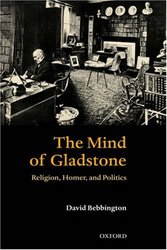Description
The author of the book traces the evolution of Gladstone's central intellectual preoccupations, theology and classical scholarship, as well as the groundwork of his early Conservatism and his mature Liberalism. In particular, the author examines the ideological sources of Gladstone's youthful opposition to reform before scrutinizing his convictions in theology. These are shown to have passed through more stages than has previously been supposed: he moved from Evangelicalism to Orthodox High Churchmanship, on to Tractarianism and then further to a broader stance that eventually crystallized as a liberal Catholicism. His classical studies, focused primarily on Homer, also changed over time, from a version that was designed to defend a traditional worldview to an approach that exalted the depiction of human endeavour in the ancient Greek poet. An enduring principle of his thought about religion and antiquity was the importance of community, but a fresh axiom that arose from the modifications of his views was the centrality of all that was human. The twin values of community and humanity are shown to have conditioned Gladstone's rhetoric as Liberal leader, so making him, in terms of recent political thought, a communitarian rather than a liberal, but one with a distinctive humanitarian message. As a result of a thorough scrutiny of Gladstone's private papers,
Gladstone's ideas are far more accessible for analysis now that, following the publication of his diaries, a record of his reading is available. This book traces the evolution of what the diaries reveal as the statesman's central intellectual preoccupations, theology and classical scholarship, as well as the groundwork of his early Conservatism and his mature Liberalism. In particular it examines the ideological sources of Gladstone's youthful opposition to reform before scrutinizing his convictions in theology. These are shown to have passed through more stages than has previously been supposed: he moved from Evangelicalism to Orthodox High Churchmanship, on to Tractarianism and then further to a broader stance that eventually crystallized as a liberal Catholicism. His classical studies, focused primarily on Homer, also changed over time, from a version that was designed to defend a traditional worldview to an approach that exalted the depiction of human endeavour in the ancient Greek poet. An enduring principle of his thought about religion and antiquity was the importance of community, but a fresh axiom that arose from the modifications of his views was the centrality of all that was human. The twin values of community and humanity are shown to have conditioned Gladstone's rhetoric as Liberal leader, so making him, in terms of recent political thought, a communitarian rather than a liberal, but one with a distinctive humanitarian message. As a result of a thorough scrutiny of Gladstone's private papers, the Victorian statesman is shown to have derived a distinctive standpoint from the Christian and classical sources of his thinking and so to have left an enduring intellectual legacy. It becomes apparent that his religion, Homeric studies and political thought were interwoven in unexpected ways. The evolution of Gladstone's central intellectual preoccupations, with religion and Homer, is the theme of this book. It shows how the statesman developed from Evangelism to Orthodox High Churchmanship, on to Tractarianism and then further to a broader stance that eventually crystallized as a liberal Catholicism. It demonstrates also that his Homeric studies developed over time. Neither aspect of his thinking was kept apart from his politics. Gladstone's early conservatism emerged from a blend of classical and Christian themes focusing on the idea of community. While that motif persisted in his speeches as Liberal leader, the category of the human emerged from his religious and Homeric ideas to condition the presentation of his Liberalism. In Gladstone's mind there was an intertwining of theology, Homeric studies and political thought.
